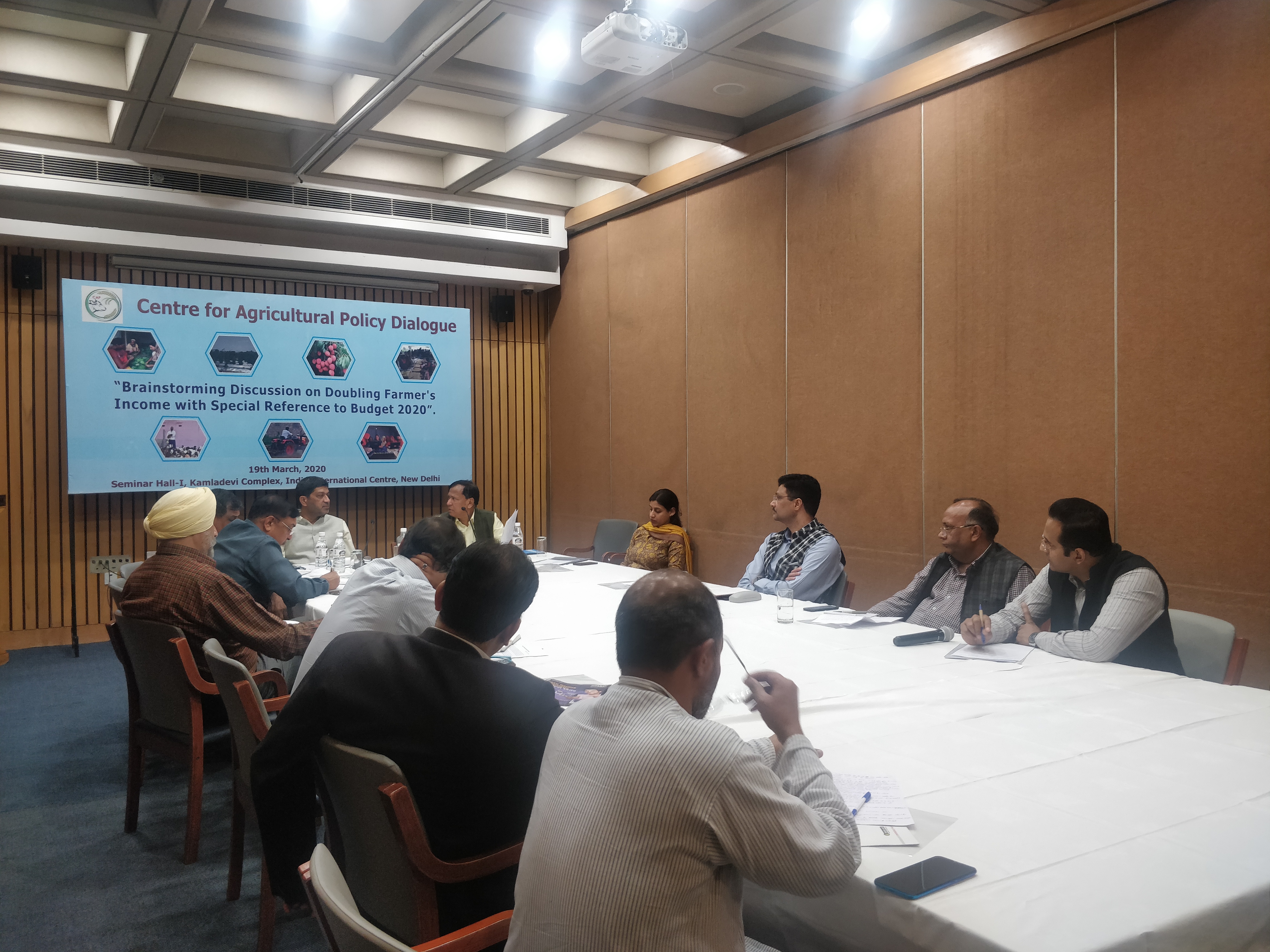
We have shared our experience and suggestions for enhancing farmers income to the Government representatives during the “Brainstorming discussion on doubling farmers income” organised by Centre for Agricultural Policy Dialogue at India International Centre on March 19, 2020. The discussion was organised with special reference to the 16-point agenda laid out in the 2020 budget of the Government of India. In the initial remarks Dr. (Prof.) T. Haque, CAP & Ex. Chair – Land Cell, Niti Ayog, explained the 16 strategies outlined in the budget 2020 for doubling farmers income. In the inaugural address, Dr. Ashok M. R. Dalwai, Chairman Committee on Doubling Farmers’ Income, Govt. of India, shared the vision of the Government and sought suggestions to improve the strategies.
The brainstorming session attended by eminent personalities and key stakeholders representing Government, farmer organisations, civil society organisations, journalists, political leaders and activists participated in the discussion and shared their views and suggestions towards enhancing farmers income. Mr. V. M. Singh, Farmer Leader; Dr. A.K. Padhee, ICRISAT; Mr. Harish Damodaran, Indian Express; Prof. P.S. Birthal, NCAP; Mr. Harvir Singh, CAP/ Outlook; Mr. Sunil Simon, Caritas-SAFBIN; Mr. Naresh Sirohi, VP BJP Kisan Morcha were the main speakers. Various views on critical points and underlying issues were discussed by the speakers.
Representing Caritas-SAFBIN, Sunil Simon, Head of SARE shared the experience of smallholder farmers from the SAFBIN programme, of using the two comprehensive approaches of collective led adaptive research and multi-stakeholder partnership have helped smallholder farmers in achieving enhanced income and resilience. Regarding the 16-point agenda in the budget, he suggested the following major points to achieve the target of doubling farmers income in the country:
• Address the structural weakness: Reform and capacitate the Agricultural education, research and extension system to cater to smallholder agriculture. Structural reform in agricultural sector is not complete if education, research and extension system which forms the basic vehicle/ carrier to meaningfully implement these reforms are not reformed and strengthened. These are mainly our agricultural education institutions, research institutions, and extension system in the country. We need to review how robust and capacitated these systems are to implement these reforms.
• Ensure farmer centric policies and decisions: Develop mechanism to ensure and assure farmers that the policies and decisions will be farmer centric. All reformation should focus to bring benefits to farmers. Farmers control should be ensured in every aspect of the decision. Farmer’s right should be made a priority.
• Direct the primary focus of doubling farmers income to smallholder farmers: The Potential to double farmers income lies mainly in the small farms which constitutes around 83% in the country. The focus and support that is presently given to the big farms and big farmers, if given to small farms and smallholder farmers, we can achieve the change we all aim to see. Small farms run much below their potential and with additional support phenomenal results can be achieved. There is a high potential to proactively utilise the under-utilised agricultural labour.
• Build institutions that focus on small farms and smallholder farmers: India has many research institutions, and probably one of the largest system in the world. The focus of this system has been large farmers. Establish / dedicate institutions to specifically focus on the problems of smallholder farmers. Invest on innovations specifically pertaining to smallholder farmers.
• Improve small farm friendly technology and technological outreach: Smallholder Farmers’ do not have easy access to new technologies and services. Specific mechanisms to enable farmers in remote / unreached locations to have better access to resources, information, technology and market would go a long way in building resilient and sustainable production system.
• Focus in sustaining ecology (beyond sustaining agriculture): Smallholder farming is mainly subsistence agriculture and not exploitative in nature. Smallholders contribute immensely to ecosystem services. Consideration should be given to transfer the economic value of the ecosystem services for the conservation efforts done by the smallholder farmers. Consumer awareness could focus on consuming products produced through conservation. The pressure on the resources must be optimised to ensure sustainability. Departmentalised planning should be shifted to integrated system based planning.
• Make land accessible to smallholder farmers: Provide fallow land available in the country to smallholder farmers. Promote collective farming. A national campaign should be taken-up for making all untilled land productive through agriculture practices or any other productive measures like renewable energy production. Making land accessible to women is crucial to achieve nutrition security in India and achieve double farm income and production.
• Focus on nutritional security through Integrated Farming System: Considering widespread malnutrition and frequent impact of climate change in the country, it is crucial to diversify crops to improve the nutrition and resilience. Local sufficiency of nutritionally diverse food will help in sustaining the healthy and resilient food system.
Dr. Ashok Dalwai assured to take note of the suggestions shared by various stakeholders to improve the Government initiative to achieve Doubling Farmers Income. Centre for Agricultural Policy will consolidate the inputs and share the suggestions with the Government for improving the initiatives around doubling farmers income.